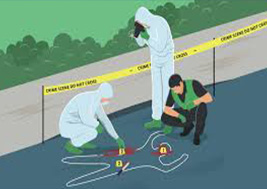Forensic Botany
Forensic botany is defined as the use of plants and plant parts including as pollen, seeds, leaves, flowers, fruits and wood in the investigation of criminal cases, legal questions, disputes, or, in non-criminal cases, to ascertain cause of death or former location. Scientists who study pollen and other spores are called palynologists.There are nearly one-half million different varieties of spores and pollen that can act as a kind of fingerprint of crime. One special quality of pollen is its durability. Properly stored, pollen can last for centuries. The shape of a leaf can lead to its being identified in some instances, DNA analysis can establish a leaf associated with a criminal suspect comes from a specific tree at the scene of a crime. It is of special interest that, not only fresh, but dried leaves can be used in forensic biology for DNA evaluation. Annual ring (growth ring) Concentric circles visible in cross-sections of woody stems or trunks.










.jpg)





















